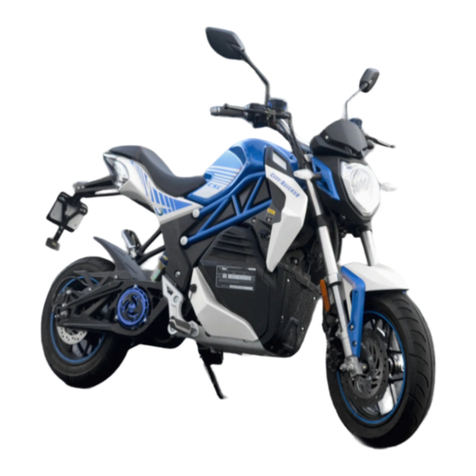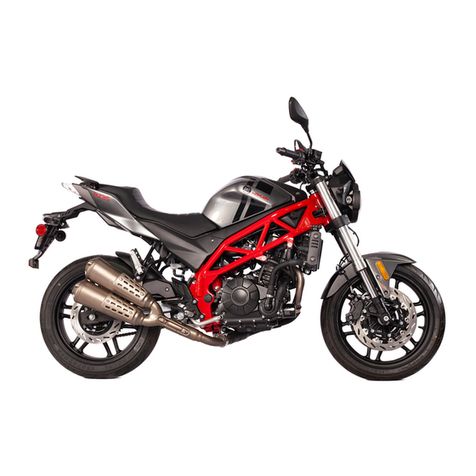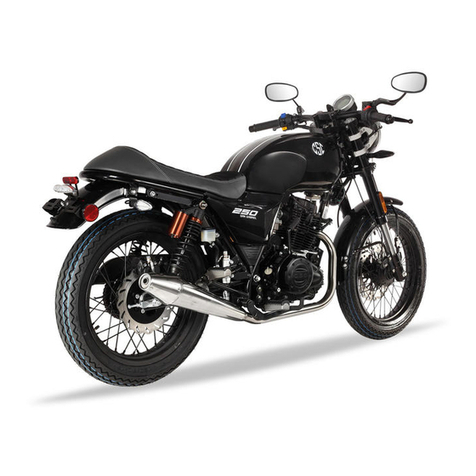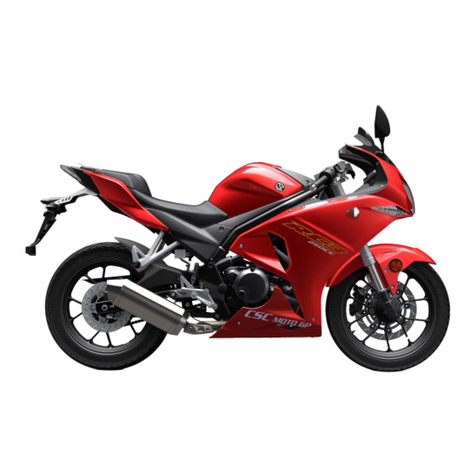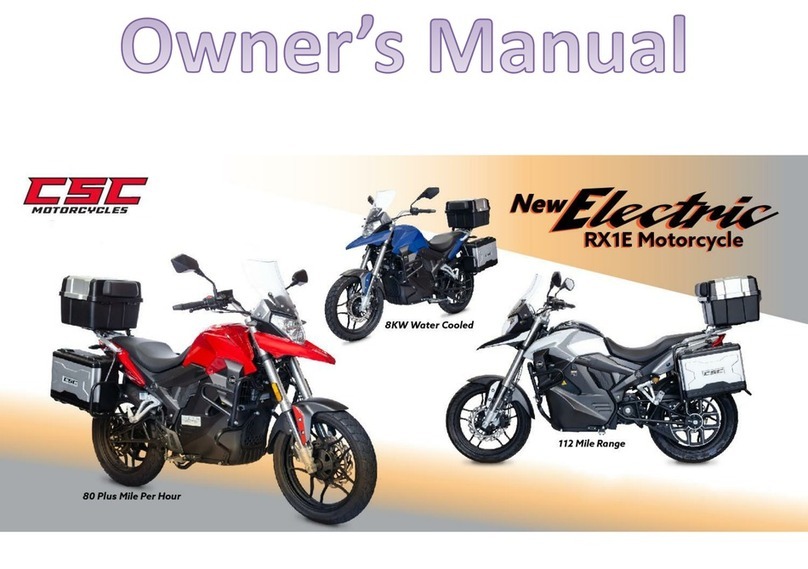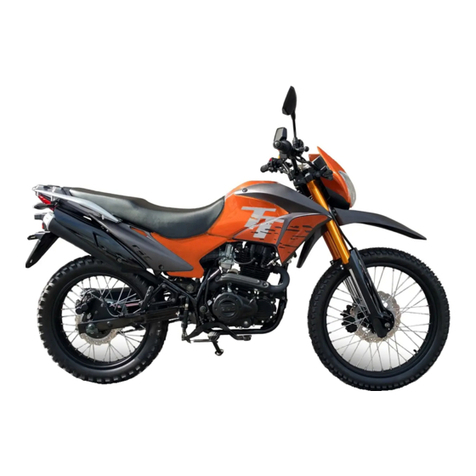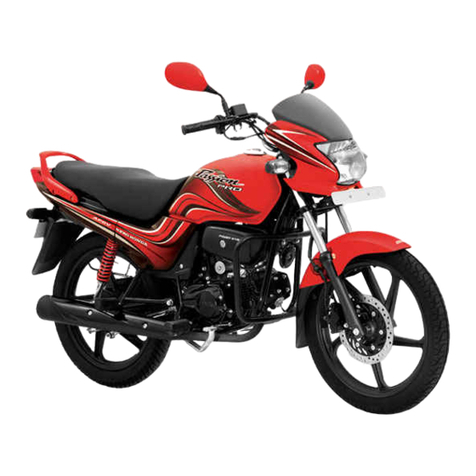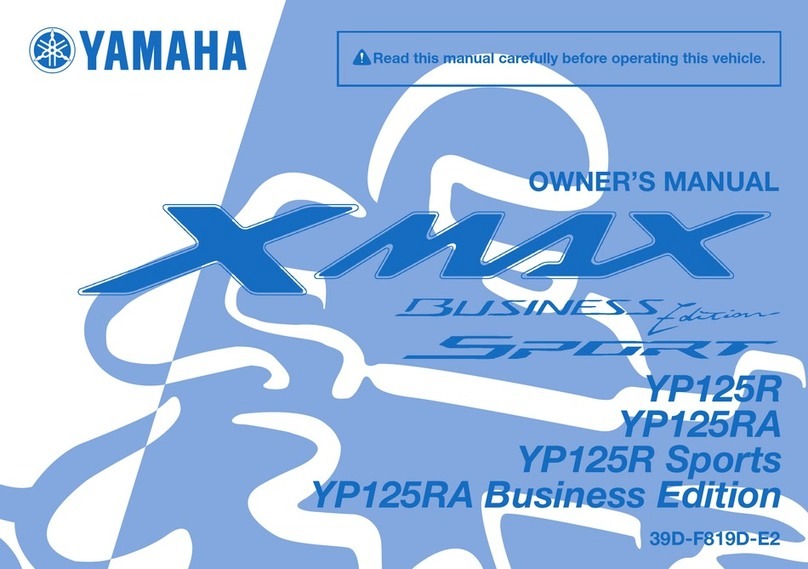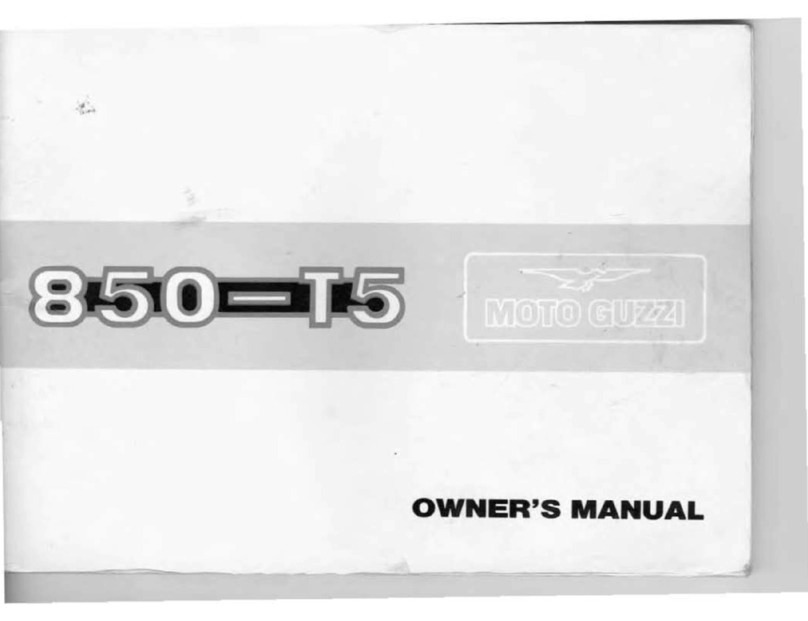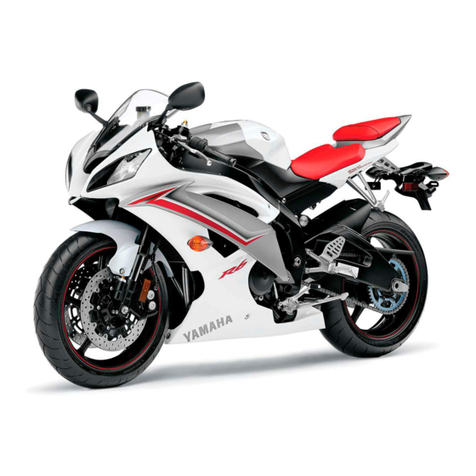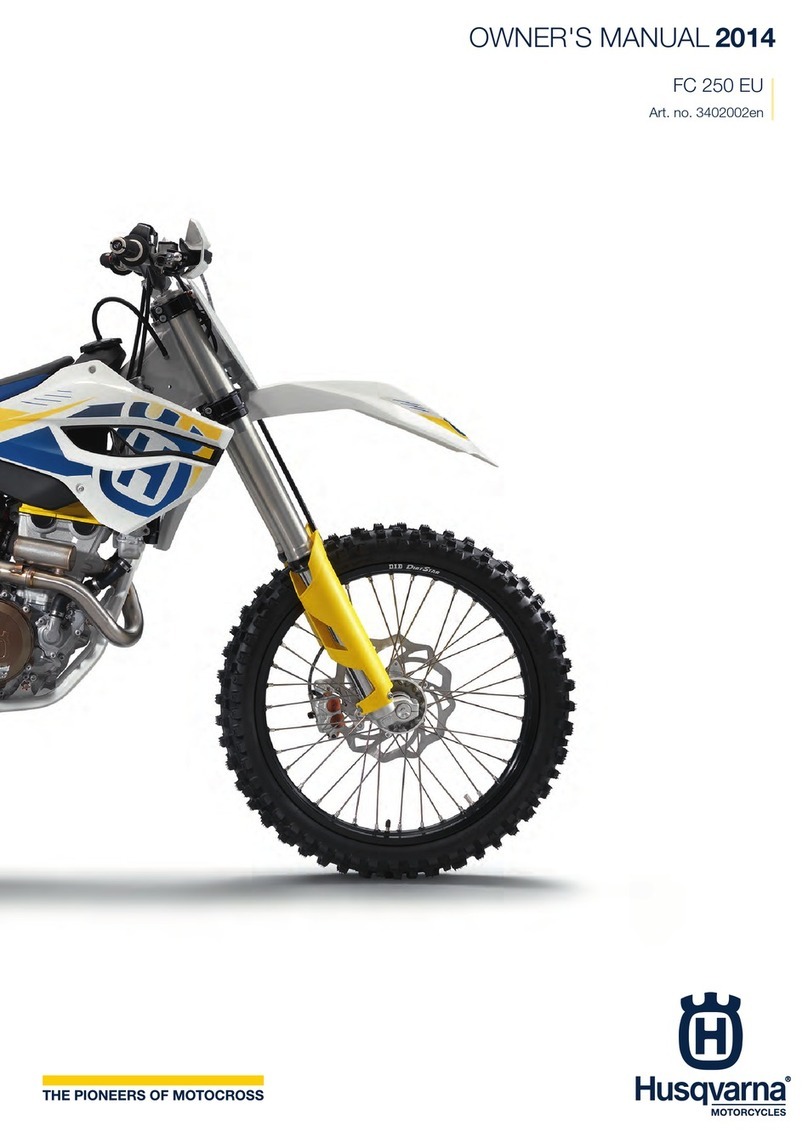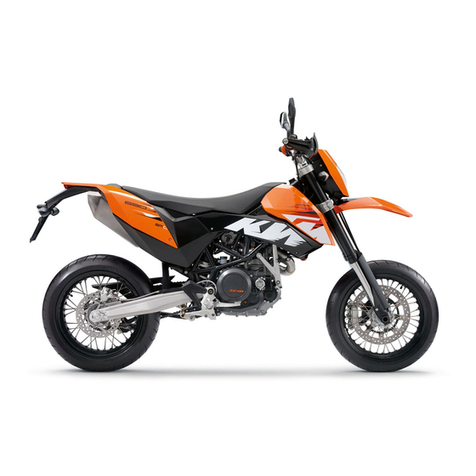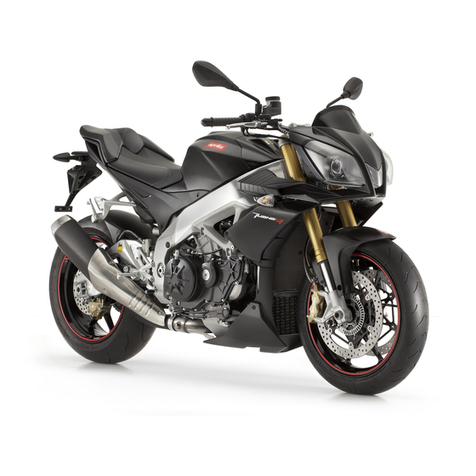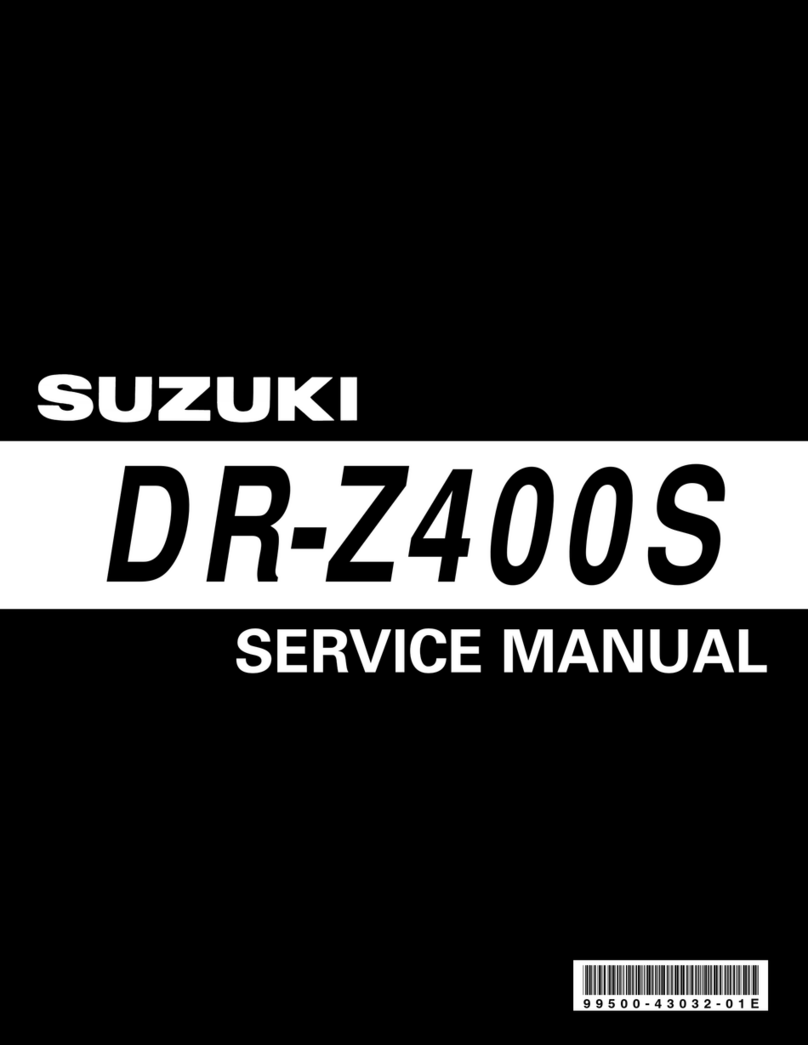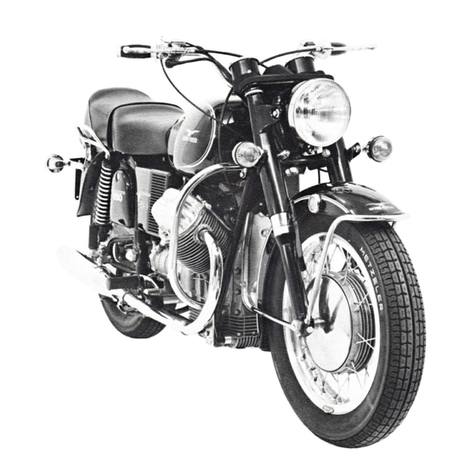CSC RE3 User manual

RE3 Owner’s Manual

1
A Word From Steve
Thank you for purchasing this CSC RE3 motorcycle. The RE3 is a great motorcycle and we are
proud of it. The RE3 is easy to maintain, it’s reliable, and it’s fun. You have made a wise
purchase decision. I want you to know that we value the trust and confidence you have in
CSC. Our guiding principle will always be that our customers come first.
We wish you many miles of safe and enjoyable riding on your new RE3 motorcycle. If there is
anything we can do to enhance your ownership experience, please let us know.
Thank you again,
Steve Seidner
Founder and CEO
CSC Motorcycles, LLC
1331 W. Foothill Boulevard, Azusa, California 91702
909 445 0900
www.CSCMotorycles.com

2
Contents
Caution and Warning Symbols .................................................................................................... 4
Section 1: Owner’s Manual ........................................................................................................ 5
VIN and Engine Numbers ............................................................................................................ 5
Motorcycle Components............................................................................................................. 6
Ignition Lock ................................................................................................................................ 9
Instruments ............................................................................................................................... 10
Left Handlebar Controls ............................................................................................................ 11
Right Handlebar Controls .......................................................................................................... 12
Fuel Tank ................................................................................................................................... 13
Motorcycle Controls.................................................................................................................. 14
Tool Kit ...................................................................................................................................... 16
Motorcycle Load Limits ............................................................................................................. 17
Break-In Procedure ................................................................................................................... 18
EFI System ................................................................................................................................. 19
General Motorcycle Safety Guidance........................................................................................ 24
Inspections Before Riding.......................................................................................................... 26
Starting Your Motorcycle .......................................................................................................... 28
Riding Your Motorcycle ............................................................................................................. 30
Safe Riding................................................................................................................................. 32
Section 2: Maintenance............................................................................................................ 35

3
Component Cleaning................................................................................................................. 36
Parts Inspection......................................................................................................................... 37
Maintenance Adjustments ........................................................................................................ 37
Recommended Tools................................................................................................................. 38
Adjustment Specifications......................................................................................................... 39
Maintenance Schedule.............................................................................................................. 40
Cleaning Your Motorcycle ......................................................................................................... 41
Checking Your Oil ...................................................................................................................... 42
Changing Your Oil ...................................................................................................................... 43
Changing Your Oil Filter............................................................................................................. 44
Air Cleaner Maintenance........................................................................................................... 45
Spark Plug Maintenance............................................................................................................ 46
Throttle Cable Maintenance and Adjustment........................................................................... 47
Front Brake Inspection .............................................................................................................. 48
Rear Brake Inspection ............................................................................................................... 49
Wheel And Tire Inspection ........................................................................................................ 50
Battery Maintenance................................................................................................................. 51
Fuse Replacement ..................................................................................................................... 52
Motorcycle Horn ....................................................................................................................... 53
Troubleshooting Guidelines ...................................................................................................... 54
Storing Your Motorcycle............................................................................................................ 55

4
Motorcycle Specifications ......................................................................................................... 56
Wiring Schematic ...................................................................................................................... 57
You should read this Owner’s Manual carefully prior to riding your motorcycle. You
should have a good understanding of the controls, their use, and how to operate the
motorcycle. The data, technical specifications and performance parameters included
in this Owner’s Manual are based on the latest data available at publication. We
reserve the right to modify this Manual at any time without prior notice.
Please purchase parts and consumables for your motorcycle only from CSC
Motorcycles. You can reach us at www.CSCMotorcycles.com or 909 445 0900.
Caution and Warning Symbols
Caution and warning symbols in this manual are as follows:
The Caution! symbol indicates a condition that may lead to motorcycle damage.
The Warning! symbol indicates a condition that may lead to injury or death.

5
Section 1: Owner’s Manual
VIN and Engine Numbers
VIN and engine numbers are located as shown below:
The VIN is printed on the
right side of the frame.
The vehicle nameplate is
attached to the right side
of the frame.
The engine number is on
the upper left side of the
crankcase.

6
Motorcycle Components
1. Rearview Mirrors
2. Left Handgrip
3. Turn Signals, Horn,
Emergency Flashers
4. Instrument Pod
5. Ignition Lock
6. Kill Switch and Starter
Button
7. Throttle
8. Fuel Cap and Lock

7
Motorcycle Components (continued)
1. Headlight
2. Front Suspension
3. Seat
4. Seat Lock
5. Gearshift
6. Left Front Footrest
7. Left Rear Footrest

8
Motorcycle Components (continued)
1. Rear Wheel
2. Muffler
3. Right Rear Footrest
4. Right Front Footrest
5. Rear Brake Lever
6. Front Wheel

9
Ignition Lock
Caution! Park the motorcycle in a safe place and
lock the handlebar to prevent theft.
Position 1: Engine run.
Turn the key to this
position and press the
start button to start the
motorcycle.
Position 2: Engine off.
Turn the key to this
position to turn off the
motorcycle.
Position 3: Motorcycle
fork locked. Turn the
forks all the way to the left
and push down on the key
to lock the front forks.

10
Instruments
The instrument cluster is located above
the headlight as shown above.
Caution! Do not over rev the engine.
Doing so will result in engine damage.
Item 1 is the LCD reset button. Press it
to cycle between the tripmeter and the
odometer. Holding this down for
several seconds in the trip mode will
reset the trip meter to 0.0. To switch
between English and metric units, turn
off the ignition, hold the button down,
turn on the ignition with button
depressed for 5 seconds.
Item 2 is the LCD screen, which shows
fuel quantity, speed, water
temperature, gear, time, and mileage.
Item 3 are indicator lights showing
high beam, low fuel, EFI fault indicator,
and neutral.

11
Left Handlebar Controls
Item 1 is the high beam flash
switch.
Item 2 is the high beam/low
beam control switch.
Item 3 is the horn switch.
Item 4 is the turn signal
switch. The turn signals are
not self-cancelling; you should
press this switch after making a
turn.
Item 5 is the emergency
flasher switch. It can be
operated with the ignition off.

12
Right Handlebar Controls
Caution! Do not crank the engine for more
than 5 seconds at a time.
Item 1 is the kill switch. Use it to
kill the engine in an emergency.
Caution! Do not use the kill switch
to routinely turn off the engine.
Use the ignition key instead.
Item 2 is the headlight switch. Use
it to turn the headlights on.
Item 3 is the starter button. Press
it after turning the ignition lock on
to start the engine.
Item 4 is the throttle. Twist it to
increase engine rpm.

13
Fuel Tank
Warning! Do not overfill the fuel tank.
Warning! Do not smoke when refilling.
Warning! Turn off the engine
when refilling.
Caution! Do not use fuel with
ethanol exceeding 15%.
Caution! Wipe up any fuel that
spills outside the fuel tank.
Item 1 is the fuel tank inlet.
Item 2 is the fuel tank lock. It uses
the motorcycle’s ignition key.
Item 3 is the fuel filter. It is
located beneath the fuel tank.

14
Motorcycle Controls
Item 1 is the front brake lever. Its
stroke is 10 to 20 mm.
Item 2 is the rear brake lever. Its
stroke is 20 to 30mm.
Warning! Check your motorcycle’s
front and rear brake operation
prior to every ride.
Warning! Service the front and
rear brakes at the intervals
recommended in this Owner’s
Manual.

15
Motorcycle Controls (continued)
Item 3 is the starter button.
Item 4 is the gear shift lever. Depress
it to downshift while actuating the
clutch. Raise it to upshift while
actuating the clutch. Neutral is
between first and second gear.
Caution! Do not attempt to shift the
motorcycle without using the clutch.

16
Tool Kit
Item 5 is the throttle. Twist it to
increase engine rpm, release it to
decrease engine rpm.
Item 6 is the motorcycle tool kit. It
includes the tools shown for simple
motorcycle maintenance. These tools
include:
•4mm, 5mm, and 6mm Allen
wrenches
•Spark plug socket
•8mm and 10mm open end
wrenches
•Pliers
•Screwdriver

17
Motorcycle Load Limits
Warning! Do not attempt to operate the
motorcycle with more than two people
(operator and one passenger).
The motorcycle is designed to carry
the rider and one passenger. You
should never exceed a total load on
the motorcycle in excess of 330 lbs.
Warning! Do not exceed a
combined load of 330 lbs.
Warning! Do not load the
motorcycle asymmetrically; balance
the loads so they are equally
distributed on the left and the
right.

18
Break-In Procedure
When an internal combustion engine is new, it should not be subjected to hard
acceleration, lugging, overheating, or running for long periods at a constant engine
speed. You should avoid these situations during the first 500 miles of service.
Caution! Do not violate the guidance provided here, or you may damage your
motorcycle engine.
We recommend the first oil change when the motorcycle reaches between 200 and
500 miles. We recommend a second oil change at 1,000 miles, and every 2,500
miles thereafter. We recommend using only 10-40W motorcycle oil. Caution!
Never use any oils intended for automotive use, or any oil that contains friction
reducing additives (use of these oils will induce clutch slippage not covered by the
CSC warranty).
Caution! Use only non-synthetic oils during the first 1000 miles of use. After that,
you may wish to change to synthetic motorcycle oil.

19
EFI System
The motorcycle is fuel injected. The fuel injection system includes the ECU, the
nozzle, the throttle, the intake sensor, the pressure sensor, the engine temperature
sensor, the ignition coil, the crankshaft position sensor, the fuel pump, and the O2
sensor. The instrument cluster includes and EFI fault indicator. It should turn on
when the ignition is turned on and turn off after the engine has started. If there is a
fault, the EFI fault indicator will turn on or flash. If the EFI indicator does this, check
the electrical connections to the components described above, the fuel lines, and
battery voltage.
Caution! Do not operate the motorcycle with less than a quarter tank of fuel. Fuel
in the fuel tank is needed to keep the fuel pump cool.
Caution! Do not install accessories that interfere with the fuel injection system. All
electrical accessories should be at least 6 inches away from EFI components.
Caution! Clean the air filter element and the throttle valve and replace the fuel filter
every 5000 miles.
Table of contents
Other CSC Motorcycle manuals
